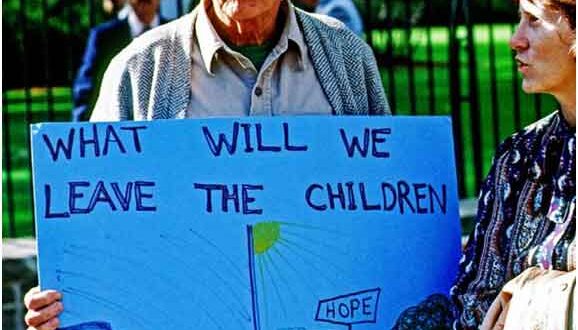For most of human history justice and peace have been the biggest concerns, the most important issues determining welfare and safety of our world. Those who understood this, and they were always a thoughtful and honest minority, therefore decided to work for justice and peace. The most thoughtful among them also understood the close linkages between peace and justice and tried to strengthen both.
Then in recent decades it became increasingly clear that about a dozen inter-related environmental problems, led by climate change, had worsened to the extent of endangering the basic life-nurturing conditions of our planet. With this realization this too became the most crucial issue along with peace and justice, incorporating also biodiversity and protection of other forms of life. Some of the most sincere, honest and thoughtful people decided to devote their life above all to checking this environmental crisis, even though there was confusion about the best way of achieving this. The most thoughtful among them also understood well the importance of integrating justice and peace concerns with environment protection concerns.
So the biggest challenge of our times is to integrate justice, peace and environment protection concerns within a democratic, participative framework so that more and more people can be involved in this.
However within this broad framework of social change, there is increasing urgency now of concentrating attention on a single most crucial objective of avoiding a catastrophic war under all circumstances, because the danger of an accidental or intentional catastrophic war involving the biggest military and nuclear weapon powers has increased in recent months like never before. The Cuban missile crisis of 1962 has been mentioned for years as the most serious flash-point for this, but clearly that was a more resolvable and smaller crisis than what has emerged in recent months. What is happening now is the drawing up of much more dangerous and durable battle lines among countries armed with over 12,000 nuclear weapons as well as brinkmanship which can result in even accidental start of nuclear war based on misunderstanding of moves and motives of adversaries.
What is also unmistakably clear is that some of the persons in top leadership positions, with the power to make decisions which can impact the entire world, have very regrettably not shown the capacity and commitment for prioritizing safety and welfare of world’s people, or even the ability of rational pursuit of the best interests of the people of their own country and allies. This is clearly the case of those in some top leadership positions in the USA, although the leadership of some other countries may not be much better.
There is a completely irrational and unnecessary urge for one country, with allies, to dominate the world, most visible just now in the USA but may be visible in others later. Leadership of two of the most powerful countries may be currently thinking—I will eventually dominate the entire world. One of them may even be thinking—I must strike now before the other has a chance to surge ahead of me. This can be the starting point for one of the the most irrational wars in world history, which may also prove to be the most destructive.
The world is increasingly divided into two rival sides armed with the most destructive weapons ever, deeply suspicious and hostile towards each other—NATO and allies on one side (although some NATO members may now be unwilling partners and two may even leave), Russia and China on the other side with perhaps 5 or 6 other countries. The majority of countries may try hard to escape the confrontation between the big two but not necessarily succeed in this.
Unlike the two previous world wars, the next catastrophic war will not be spread over a long time, and the actual fighting may not be spread over a wide area, but the consequences, because of the highly destructive nuclear and other weapons, can be much more destructive than the two previous world wars combined. At its worst, speaking on the basis of the most highly destructive nuclear and other weapons commanded by the rival sides, most life on earth and much of the life nurturing conditions of the planet can be destroyed.
Hence while the broad framework of social action is no doubt to integrate basic justice (including equality), environment protection (including biodiversity ) and peace ( including disarmament) concerns, at various levels combining local and global, the most immediate and the greatest urgency is to prevent the possibility of a catastrophic war involving the biggest military powers, because in the case of such a war all else can be lost. All the social movements should unite on this most urgent and immediate objective to take up a series of most thoughtful and well-planned actions with continuity.
 Eurasia Press & News
Eurasia Press & News




